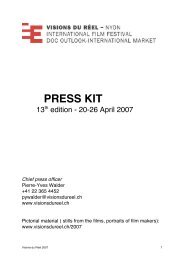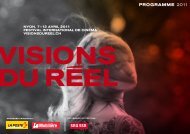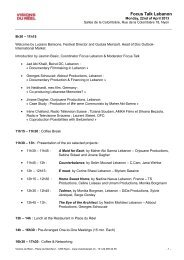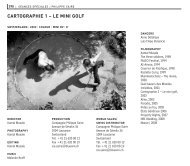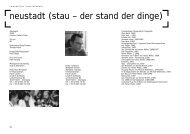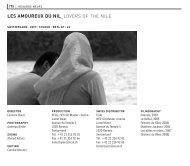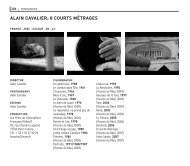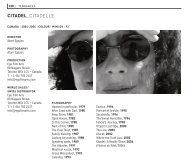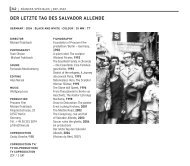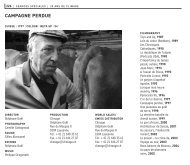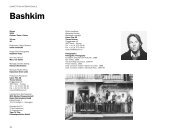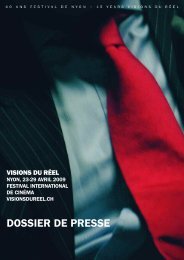Katalog 2013.pdf - Visions du Réel
Katalog 2013.pdf - Visions du Réel
Katalog 2013.pdf - Visions du Réel
Create successful ePaper yourself
Turn your PDF publications into a flip-book with our unique Google optimized e-Paper software.
atelier – laila pakalnina<br />
171<br />
A matter of<br />
atmosphere<br />
The cinema of Laila Pakalnina<br />
“This film was created<br />
to rejoice at the existence<br />
of cinema. If cinema didn’t<br />
exist, I would have<br />
to become an ice-cream<br />
vendor (that was my first<br />
dream profession).<br />
But cinema is better than<br />
ice-cream!”<br />
director’s statement for<br />
“Picas”, 2012<br />
Laila Pakalnina is not a rational filmmaker.<br />
In her extremely thoughtful incoherence<br />
she has directed and pro<strong>du</strong>ced<br />
more than twenty films. “A film is a film”<br />
she says, no matter if short, mediumlength,<br />
feature, documentary, fiction:<br />
the process and the pro<strong>du</strong>ction methods<br />
might be different, but certainly<br />
not the attitude, which is one – though<br />
constantly evolving – and permeates<br />
equally all her films.<br />
Her first works, especially the trilogy<br />
Vela (The Linen, 1991), Pramis (The<br />
Ferry, 1994) and Pasts (The Mail, 1995),<br />
already reveal some of the particular<br />
aspects and qualities of her future<br />
works. Vela is her gra<strong>du</strong>ation work<br />
at VGIK, the renowned national film<br />
school in Moscow, where she met Gints<br />
Berzins, the cinematographer who,<br />
starting from these films, will become<br />
her recurrent DOP, heavily contributing<br />
in the creation of Pakalnina’s distinctive<br />
visual style. The three films focus<br />
on daily routines, we could almost say<br />
they focus on nothing special. What<br />
makes these three black and white<br />
shorts extraordinary is that in none of<br />
them words are the key point and maximum<br />
relevance is given to the smaller<br />
gesture, to the creative use of sound,<br />
to the extremely stylish and meaningful<br />
framing, finally: to the “atmosphere”,<br />
possibly the most important concept<br />
in the director’s filmic way of thinking.<br />
These three films already bring the<br />
marks of a complex and yet extremely<br />
accessible universe, a unique mixture<br />
of lightness, empathy, attentiveness<br />
and depth, in which the often difficult<br />
reality Pakalnina depicts becomes<br />
utterly poetic. On a different layer we<br />
could notice another recurring note<br />
in Pakalnina’s cinema: her country.<br />
Doms (The Dome) was filmed in 1991,<br />
the same year of Vela, and is possibly<br />
the most frantic film of Pakalnina. She<br />
films the main church in Riga becoming<br />
a shelter for the people who stood<br />
up for independence <strong>du</strong>ring the barricades.<br />
Pakalnina reveals a more direct<br />
social and political approach, which she<br />
will later develop as an editorial writer<br />
for the most important Latvian daily<br />
newspaper, “Diena”. The corpus formed<br />
by the trilogy, Doms and all the works<br />
of the early to mid-nineties could also<br />
finally be considered as very personal<br />
yet exceptional documentation on the<br />
transition from Soviet Union occupation<br />
to independence in Latvia.<br />
In Ozols (The Oak, 1997) we notice a<br />
more evident formal apparatus, based<br />
on slow panoramic shots and frontal,<br />
almost “suspended” presentations of<br />
a complex and yet extremely<br />
accessible universe,<br />
a unique mixture of lightness,<br />
empathy, attentiveness and<br />
depth, in which the often<br />
difficult reality Pakalnina<br />
depicts becomes utterly poetic.<br />
her characters, which we will later see<br />
applied in several future works both fiction<br />
and documentaries. We can also<br />
find here a particularly intense sense<br />
of nature – and man as a part of it –<br />
which will become a distinctive trait of<br />
Pakalnina’s poetic universe. Her first<br />
fiction feature Kurpe (The Shoe, 1998,<br />
selected at the Cannes Film Festival)<br />
and her second, Pitons (The Python,



